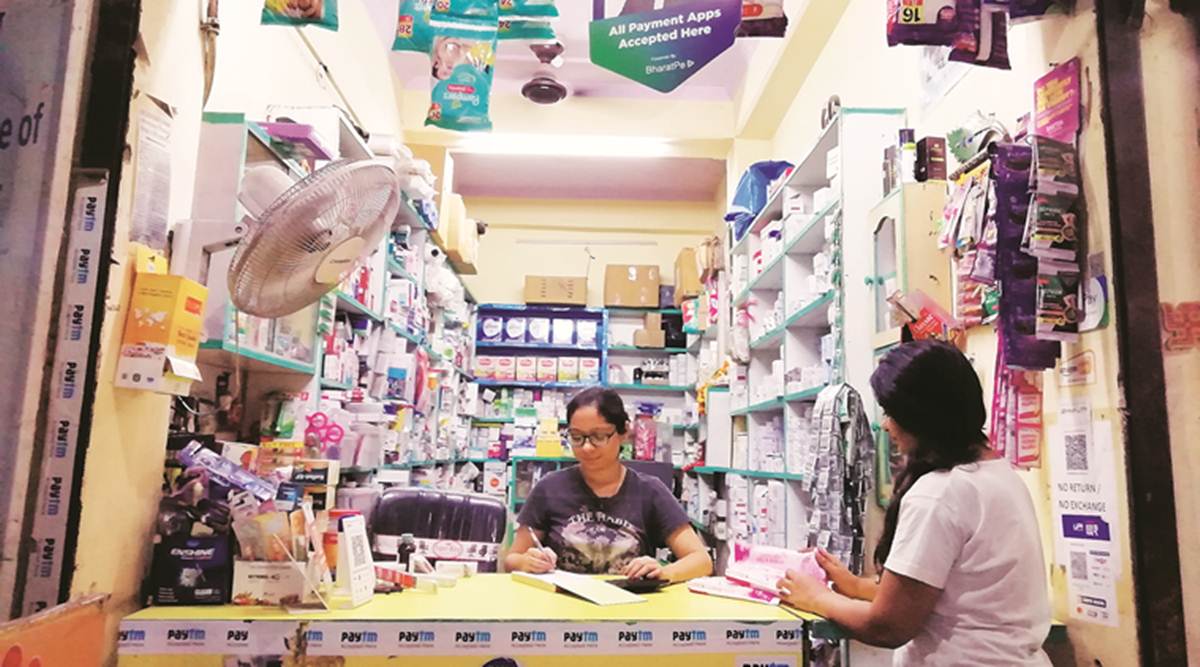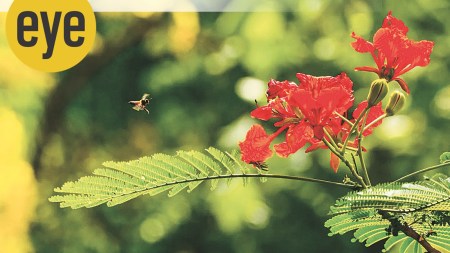- India
- International
‘Only Re 1’: Customers line up for sanitary pads as price slashed at Jan Aushadhi stores
Customers, including men, are lining up, for family, relatives, delighted at the slashed price of the Suvidha packets. But the owner of the store wishes govt had done more to advertise them
 Yasmita Arora says she is used to buyers using all kinds of gestures and sign language to ask for napkins. She has been selling 500 pads in two days. (Express Photo: Koel Banerjee)
Yasmita Arora says she is used to buyers using all kinds of gestures and sign language to ask for napkins. She has been selling 500 pads in two days. (Express Photo: Koel Banerjee)
“Sirf ek rupay (only Re 1)!” Throughout the day, those dropping in at the Jan Aushadhi medical store in Shakarpur, East Delhi, can barely disguise their surprise.
Among them Alvira Mukherjee, a teacher at Vivekananda College in Vivek Vihar, Delhi, who stops over on way back home to Laxmi Nagar from college. So, instead of one pack of Suvidha oxo-biodegradable sanitary pads, Mukherjee, 27, decides to buy two. “I regularly buy medicines from this store, but was unaware these pads were available for just Re 1,” she says.
It’s been a month since the government slashed the cost of these pads — from Rs 10 for a pack of four to Rs 4. Made by the Bureau of Pharma Public Sector Undertakings of India (BPPI), the pads were first launched last year in June under the Pradhan Mantri Bhartiya Janaushadhi Pariyojana, which aims to provide “quality generic medicines at affordable prices” through Jan Aushadhi stores like these. The Re 1 pads were launched on August 27 this year.
In its manifesto, the BJP had promised sanitary napkins at this minimal price, calling it part of efforts to ensure availability of reproductive and menstrual health services to women across India. “This promise was honoured by re-launching the pads at Re 1,” BPPI CEO Sachin Singh told The Sunday Express over email. “It will also help in fulfilling the Prime Minister’s dream of ‘Clean India & Green India’ as these pads are oxo-biodegradable and environment friendly.”
Yasmita Arora, the owner of the Shakarpur Jan Aushadhi store, says customers, cutting across age, gender and class, have been buying the pads for themselves, their wives and daughters or relatives. While earlier she would sell around 500 of the Rs 10 pads per week, she has been selling as many in two days now, Arora says.

But it’s Arora who has to tell customers about the new price first. “When Suvidha was launched, the government had distributed 100 packets each to all Jan Aushadhi kendras for free, and put up banners advertising the same. This time the government has not taken any such initiative, and given us only 10 free packets,” says the 27-year-old. “So I spread the word when people come.”
In one corner of Arora’s shop, 45-year-old Anju, with a dupatta wrapped around her head, has been waiting for some time, throwing anxious glances at the three male customers. Arora, realising what the matter was, seeks her out with a questioning glance, and Anju lifts two fingers and mouths the word “packet”.
While cotton swabs, band-aids and toothbrushes lie on top of the counter, and shampoos and diapers hang from a rod above, Arora takes out the Suvidha packs from inside a cabinet. She then decides to leave some lying around on the counter too.
Anju, who lives nearby, says she and her 24-year-old daughter have been using Suvidha for a year. “When I heard the pads had become cheaper, I bought some extra packets for my relatives,” she says.
As she leaves, some of the men around purchase a packet of Suvidha for family members to try.
A pharmacy graduate, Arora opened the store in July 2016 with a partner, but has been running it alone since 2017. Anyone with a degree in B Pharma, D Pharma or a doctor is qualified to open an Aushadhi store. During peak hours, Arora’s mother Saroj pitches in to help. Divorced and a single mother, Saroj runs the house with the money earned from the store and rent from a part of their house.
Arora says she places the orders for Suvidha with a Gulabi Bagh-based distributor every two-three days, as per demand. Sometimes NGOs working for women place orders in bulk. “Recently, the Betiya Foundation ordered 5,000 packets,” says Arora, nodding to greet her latest customer, Geeta Sodhi.
Sodhi, 48, the owner of a confectionery shop located opposite the store, says in a hushed voice, “Give me 12 packets.” While she does not say the word napkin, Arora, like earlier, knows exactly what Sodhi is talking about. She is used to buyers using all kinds of gestures and sign language to ask for napkins, Arora smiles.
As she heads back to her shop, Sodhi says she has two daughters, and between them they require a large number of sanitary pads. “Other brands are expensive but Suvidha napkins are cheap and of good quality. They bring a difference to our monthly budget.”
Located in the bustling East Delhi market, Arora’s store has few idle moments, especially towards the evening. Around 8.45 pm, Deepika Shukla, 18, a second-year student of Vivekananda College, drops in. “The pads are popular in my family,” she says.
Shikha Gupta, 47, a regular at the store, has heard about the Suvidha napkins for the first time today. A resident of Mayur Vihar Phase-3, she decides to buy a pack for her daughter. “My husband and I are diabetic. Moreover, he has a stent in his heart. Our medical bills keep skyrocketing. Even small savings are helpful,” she says.
However, not all who come to Arora’s store are happy with the quality. Sarika Verma, 31, says, “The pads come in only one size. They are unsuitable for heavy flow and need to be changed frequently. I only use them at home.”
Amandeep Kaur, 32, has the same concerns. “I keep a stock of both Suvidha and other expensive brands. Instead of reducing cost, the government could have kept the price same and improved the quality of the pads,” she says.
The BPPI’s Singh counters with details on why Suvidha is better than other sanitary pads. “The raw materials used are certified for biodegradability by the Central Institute of Plastics Engineering & Technology, Chennai. The price was fixed at Re 1 per pad despite hefty loss and expenditure (to us), right from procurement to distribution. The government subsidises the loss.”
Around 9 pm, as Arora is waiting for Saroj to arrive with dinner, Seema Katiyal comes running for a strip of Vitamin E capsules. Arora slips in a word about Suvidha, but the 45-year-old declines. “I prefer using cloth,” she says. “I have tried napkins but felt extremely uncomfortable.”
Minutes later, Arora’s mother is there with piping hot roti-sabzi. Their home is just two minutes away but Arora prefers to eat at the shop as she wraps up work. By the time the mother and daughter head home, it is 10 pm and the market is almost silent.
May 07: Latest News
- 01
- 02
- 03
- 04
- 05





































